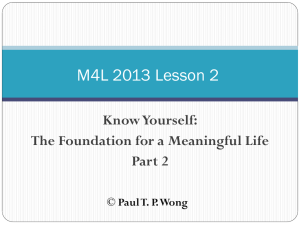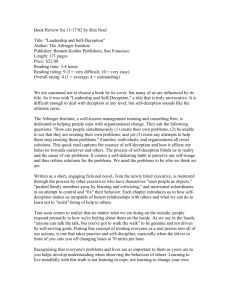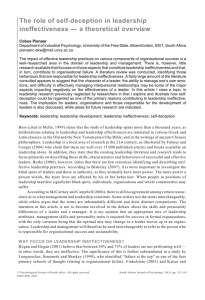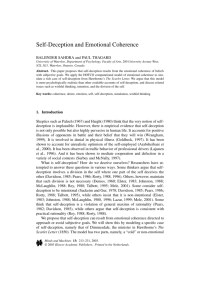Roger Haines - West London Humanists and Secularists
advertisement
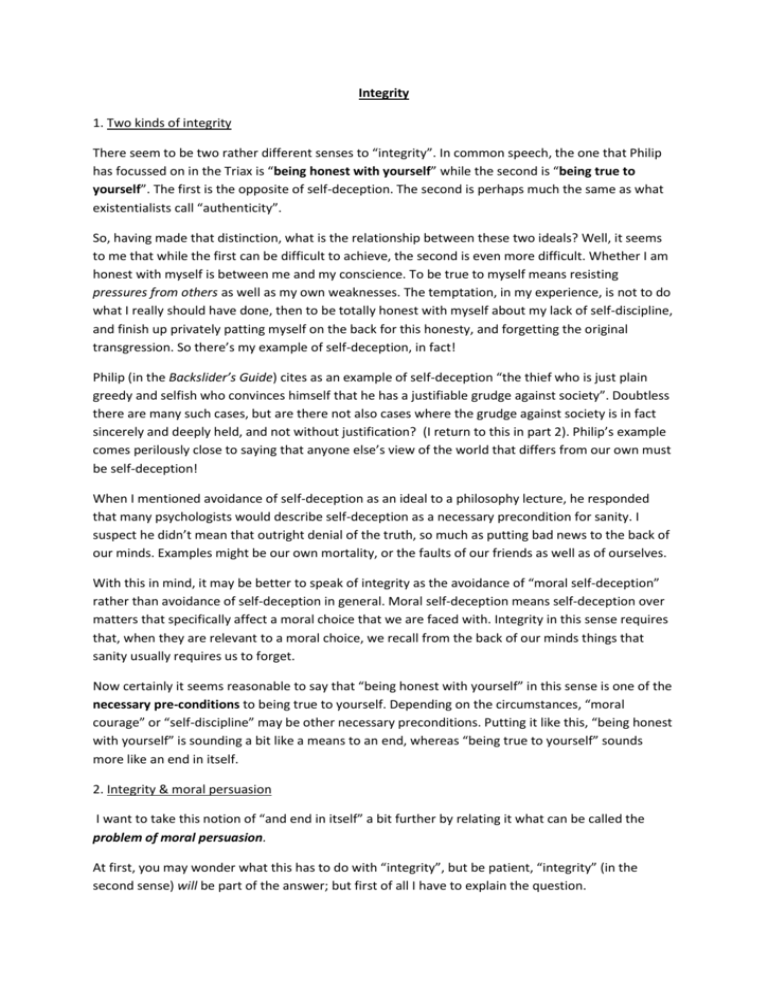
Integrity 1. Two kinds of integrity There seem to be two rather different senses to “integrity”. In common speech, the one that Philip has focussed on in the Triax is “being honest with yourself” while the second is “being true to yourself”. The first is the opposite of self-deception. The second is perhaps much the same as what existentialists call “authenticity”. So, having made that distinction, what is the relationship between these two ideals? Well, it seems to me that while the first can be difficult to achieve, the second is even more difficult. Whether I am honest with myself is between me and my conscience. To be true to myself means resisting pressures from others as well as my own weaknesses. The temptation, in my experience, is not to do what I really should have done, then to be totally honest with myself about my lack of self-discipline, and finish up privately patting myself on the back for this honesty, and forgetting the original transgression. So there’s my example of self-deception, in fact! Philip (in the Backslider’s Guide) cites as an example of self-deception “the thief who is just plain greedy and selfish who convinces himself that he has a justifiable grudge against society”. Doubtless there are many such cases, but are there not also cases where the grudge against society is in fact sincerely and deeply held, and not without justification? (I return to this in part 2). Philip’s example comes perilously close to saying that anyone else’s view of the world that differs from our own must be self-deception! When I mentioned avoidance of self-deception as an ideal to a philosophy lecture, he responded that many psychologists would describe self-deception as a necessary precondition for sanity. I suspect he didn’t mean that outright denial of the truth, so much as putting bad news to the back of our minds. Examples might be our own mortality, or the faults of our friends as well as of ourselves. With this in mind, it may be better to speak of integrity as the avoidance of “moral self-deception” rather than avoidance of self-deception in general. Moral self-deception means self-deception over matters that specifically affect a moral choice that we are faced with. Integrity in this sense requires that, when they are relevant to a moral choice, we recall from the back of our minds things that sanity usually requires us to forget. Now certainly it seems reasonable to say that “being honest with yourself” in this sense is one of the necessary pre-conditions to being true to yourself. Depending on the circumstances, “moral courage” or “self-discipline” may be other necessary preconditions. Putting it like this, “being honest with yourself” is sounding a bit like a means to an end, whereas “being true to yourself” sounds more like an end in itself. 2. Integrity & moral persuasion I want to take this notion of “and end in itself” a bit further by relating it what can be called the problem of moral persuasion. At first, you may wonder what this has to do with “integrity”, but be patient, “integrity” (in the second sense) will be part of the answer; but first of all I have to explain the question. The question, briefly, is “how is moral persuasion possible”. In other words how is it possible, in principle, that you or I can be persuaded that something is morally right when initially we feel that it is wrong (or vice versa)? I don’t mean that somebody who believes in capital punishment for murder, for example, being persuaded that a particular individual should swing - that is more a case of factual persuasion. By moral persuasion I mean how might such a person be persuaded that capital punishment is wrong in any case, or conversely, how might an opponent of capital punishment be persuaded that it can be right after all. The reason this is an important question is that theistic religions believe that they have a readymade answer to this question, which we can’t match. In the context of religion, all you have to prove, allegedly, is that some moral rule in question is the Will of God, so then “of course” we ought to follow it. We need a better answer. To see how difficult this is, take for example the “Golden Rule”, and let me play “Devil’s advocate”, if that’s not doubly blasphemous in a Humanist meeting. The supposed merit of the Golden Rule, that is doing unto others as you would have them do to you, is that if everybody followed it we’d all be better off, in loose terms. But surely this is just a reason for advocating the Golden Rule, and for pretending to follow it, certainly, but not for following it myself. Rational self-interest is best served by cheating. Scientists may argue whether the Golden Rule is a social construct, a “meme”, or the reflection of a genetic predisposition, but all such accounts are just description, not prescription. Indeed, exactly the same explanations can be given for xenophobia, for example. Explanation is value-neutral - it doesn’t make something right or wrong. It was this sort of line of argument that has led many, perhaps most, moral philosophers to agree with David Hume that there is no way to proceed rationally from an “is” statement to an “ought” statement. Some followers of Hume have gone further and declared provocatively that a moral assertion has the status of nothing more than a grunt of approval or disapproval. This view seems to leave no room for moral persuasion. If you don’t like marmite, that’s an end of it, and if moral judgement is akin to taste, then likewise all attempts at persuasion can be met with the same rebuttal – “that’s not how I feel”. This is where integrity comes in, because one way out of this situation is offered by the thought that integrity in the second sense is perhaps one human value that is universal – that everybody wants to be true to themselves, that this arises from the very nature of human consciousness, our “sense of self”. Then moral persuasion can be explained as persuading somebody that doing or not doing the action is question is or is not being true to themselves. “I ought” can then be recognized as the name we give to the specific feeling of being so persuaded. To test this account, let us consider how it applies to an amoral person – can such a person be described as having integrity? Well, I suggest that there is no such a thing as a truly amoral person – all we mean when we use the term is that the person in question does not respect any moral obligation towards others – they recognize only a duty to themselves, but that too is a part of morality. They are still trying to be true to a preferred self-image, although this may be along the lines of being the “king of the jungle”, or (like Philip’s thief) of having a grievance against the world, for example. They may fail even in this assumed duty to themselves, through lack of courage or laziness for example. Such a failure, in fact, lacks integrity – like all of us at some time, they act in one way although genuinely believing that they ought to act in another. Paradoxically, a lazy criminal may be more immoral than one who sticks to their job! The idea that the drive for integrity (in the second sense) is the source of moral feeling ties in with the unfixed nature of moral judgement as observed in real life. Psychologists observe that the constructed self is always a work in progress, and so being true to that self must mean different things to different people at different times. The raw material for that process is the sum of all one’s experiences, including rational exchanges with others as well as direct experience, observation, imaginative fiction, inner reflection and so on. Hence moral persuasion ultimately occurs when some event, some analogy, some insight extends or unearths or re-emphasises some element of a person’s understanding of themselves in relation to the world. A very good example is the “meet the victim” technique in penal rehabilitation, which can persuade the criminal that they have more in common with the victim than they imagined. If this a new experience, then it is not self-deception that is being removed but simply deception, by social circumstances. Roger Haines, 14/3/2012



